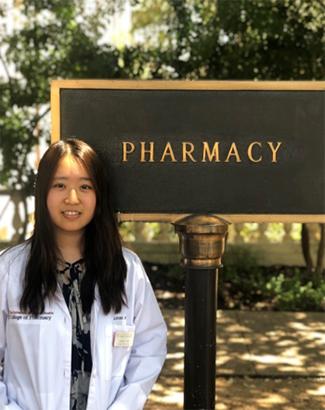
Student pharmacist Johana Suh earned an undergraduate fellowship award for research on 3D bioprinted modeling of the neurodegenerative disease NPC-1, or Niemann-Pick disease type C1. Suh is a second-year Doctor of Pharmacy candidate in The University of Texas at Austin College of Pharmacy, and serves as an undergraduate researcher in the Pharmaceutical Engineering and 3D Printing (PharmE3D) Labs led by Mo Maniruzzaman, Ph.D.
“I’m so excited that Johana Suh was awarded this highly prestigious accolade that will help expand her important research,” says Maniruzzaman, who is an assistant professor in the College of Pharmacy’s Division of Molecular Pharmaceutics and Drug Delivery. “I was quite surprised when Johana first pitched her idea about 3D fabrication of a biological disease model, which we all know is not an easy task. This kind of ‘high-risk high-reward’ idea coming from a second-year Pharm.D. student reminded me of the high calibre of our student pharmacists. I’m also thankful to my Ph.D. student Jiawei Wang who has assisted Johana in the labs.”
Niemann-Pick disease type C1 is a progressive lysosomal storage disorder caused by a mutation in the NPC-1 gene which creates abnormal and uncontrolled accumulation of lipids and cholesterol in areas such as the brain tissue. Disease remodeling may contribute to a better understanding of the primary functions of the NPC-1 gene and its disease progression and gain more insight its underlying causes. This could potentially lead to improve understanding of other neurodegenerative disorders, such as Alzheimer's disease.
“During my time in pharmacy school, I have found a growing interest in learning how developments in modern pharmaceutical science can be used creatively to change the way we visualize, treat and fight disease,” says Suh. “This fellowship has opened the door for me to explore this passion further.”
The University of Texas at Austin’s Undergraduate Research Fellowship (URF) is offered by the School of Undergraduate Studies and provides up to $1,000 in support for specific scholarly research projects conducted by full-time UT undergraduate students enrolled in any department. Sponsored by the Office of the Vice President for Research with support from the academic colleges, these fellowships are intended to cover costs associated with academic research projects proposed and written by student applicants and undertaken with the supervision of a university tenured or tenure-track faculty member, lecturer, senior lecturer or full-time research scientist or engineer.
UT’s Pharmaceutical Engineering and 3D Printing (PharmE3D) labs represent a state-of-the-art facility established in 2019 with faculty start-up support and a Faculty Science and Technology Acquisition and Retention (STARs) award with a combined value of $1 million from UT Austin. The labs are housed within the Division of Molecular Pharmaceutics and Drug Delivery in UT’s College of Pharmacy and are dedicated to pharmaceutical continuous manufacturing, process engineering, 3D printing and 3D bioprinting.
PharmE3D Labs have been awarded two URF fellowships in a row. The previous award was for Joon Kim, a second year Chemical Engineering and Biochemistry student at UT Austin. Joon is working on 4D printing of novel medical devices for on-demand stimuli responsive drug delivery and assisted by Jiaxiang Zhang, Ph.D., a postdoctoral research fellow in the Maniruzzaman Lab.
Maniruzzaman has also been awarded a newly-launched Research Reboot Program Award, sponsored by the Office of the Executive Vice President and Provost in collaboration with the deans from each college and school. The university created the Research Reboot Program in an effort to address the negative impact the COVID-19 pandemic has placed on the advancement of faculty members’ professional careers and help accelerate the resumption of their research and scholarship trajectories.
Maniruzzaman’s group will utilize the award money to research biologics (protein, cell and peptides) based hybrid drug delivery systems for SARS-CoV-2 (COVID-19) type pathogens through a first-in-class 3D printing technology developed in PharmE3D Labs: Sprayed Mass Adsorbed-particle Reposing Technology (SMART). Unlike the traditional method to develop drug loaded particles such as milling and nanoprecipitation, SMART tailors the size and geometry of fabricated dry particles more precisely in a faster process.

